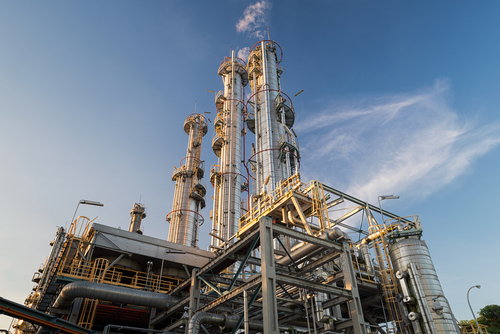
Gov. Tom Wolf on Friday vetoed House Bill 1100, an energy and fertilizer manufacturing tax credit bill, in a move that supporters of the legislation said would sacrifice high-paying jobs for Pennsylvania workers during a period of economic strain created by the COVID-19 outbreak.
“As Pennsylvania faces economic uncertainty and job loss amid this pandemic, the governor has chosen to veto critical legislation that would have boosted our economy and provided hundreds of family-sustaining jobs,” said state Rep. Aaron Kaufer (R-Luzerne). “I am disappointed that the governor would turn his back on the opportunity to bring jobs to our region while our communities are suffering immense financial distress.”
HB 1100 would give tax credits to manufacturers using Pennsylvania-produced methane to make ammonia, urea and methanol. The tax credits would be given to a company that invested at least $450 million in a project and created at least 800 temporary and permanent jobs. The tax credit is production-based and would come after the projects are completed.
The Pennsylvania Manufacturers’ Association recently released an economic impact study that analyzed the prospect of two natural gas synthesis plants located in northeast Pennsylvania.
“With just the first two projects, House Bill 1100 would have attracted a billion dollars in upfront capital investment, hundreds of millions of dollars in wages to construct and staff the plants, and more than 3,500 direct, indirect, and induced jobs across northern and northeastern Pennsylvania,” said David N. Taylor, president & CEO of the Pennsylvania Manufacturers’ Association (PMA). “This manufacturing industry — and the value it brings — could be the foundation of an entirely new economy, one that would provide family-sustaining jobs for generations to come. Governor Wolf’s veto of House Bill 1100 forfeits that future.”
A bipartisan group of lawmakers pledged to override the governor’s veto of the bill, which the General Assembly has until the end of the legislative session to do. The bill passed with a bipartisan vote of 157-35 in the House and 39-11 in the Senate, which House Speaker Mike Turzai (R-Allegheny) had previously referred to as veto-proof majorities.
“We will rally as a Commonwealth and beat back the coronavirus pandemic, and when we do it will be time to get Pennsylvanians back to work by overriding Governor Wolf’s veto of House Bill 1100,” said state Sen. John Yudichak (I-Luzerne/Carbon).
Warren F. Faust, president of the Northeast Pennsylvania Building and Construction Trades Council, said HB 1100 would have created economic growth during a critical time for the nation. “House Bill 1100 would promote manufacturing products from resources readily available right here in northeastern Pennsylvania, the very same products we are now currently importing from other countries that could and should be manufactured in the United States,” he said.
In his veto statement, the governor questioned whether this particular taxpayer-funded economic development incentive was a responsible use of the Commonwealth’s limited resources.
“I could be supportive of awarding an incentive such as this, but only after a thorough analysis of a proposed project and the inclusion of appropriate enforcement mechanisms to ensure that workers constructing these types of facilities rightfully are paid prevailing wages,” Wolf said.
PMA’s Taylor noted that there are currently thousands of construction jobs in western Pennsylvania thanks to similar tax incentives.
“We’ve seen the success that a production-based, Pennsylvania-focused tax incentive can bring to our commonwealth. Right now, there are 6,500 construction jobs in western Pennsylvania because of a similar program and we want the hardworking folks of northeast Pennsylvania to have the same opportunity.”
In Beaver County, the Shell ethane cracker plant, the largest construction site in North America, supports 6,500 construction jobs and the manufacturing plant being built will sustain more than 600 manufacturing jobs, according to PMA. The Pennsylvania Resource Manufacturing Tax Credit, passed by the Corbett Administration in 2012, helped bring that project to Pennsylvania rather than another state.
The Pennsylvania AFL-CIO, the Pennsylvania Chamber of Business and Industry, the Marcellus Shale Coalition and the Pennsylvania Chemical Council are among a number of organizations that have supported HB 1100.